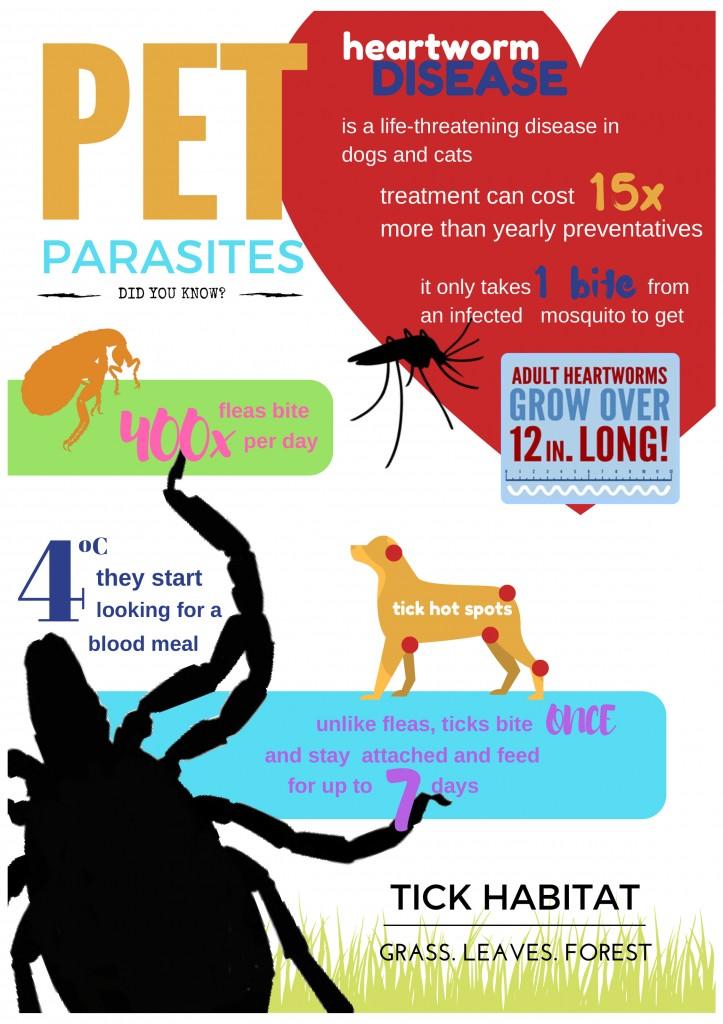By Dr. Brian Laing
With the warm weather comes the return of parasites attempting to prey on our pets. How do we choose what to use to protect our pets and family with the plethora of products on the market? I personally believe in tailoring preventive care, both vaccines and anti-parasitics, to your family and pet’s lifestyle and situation. As an example, a pet with a town or city lifestyle will have different risks with regard to parasites than a pet with a country or cottage lifestyle. Similarly a family with very young children who are constantly putting their hands in their mouths will have different concerns than a retired couple. Parasite Facts:
Ticks
 Ticks are a relatively new risk in this area (York and Durham Regions, Ontario) . Aside from the obvious unappealing prospect of being bit by a tick, ticks can carry a number of diseases, the most dangerous being Ly
Ticks are a relatively new risk in this area (York and Durham Regions, Ontario) . Aside from the obvious unappealing prospect of being bit by a tick, ticks can carry a number of diseases, the most dangerous being Ly
me disease. Lyme disease is Lyme disease has been reported in the Rouge Valley so it is now a risk in this area if your dog frequents long grassy or bushy areas. The first symptoms your dog develops if it contracts Lyme disease is arthritis and it starts weeks to months after the bite. The most serious long-term effects are heart disease, neurologic signs and kidney disease. Humans are much more susceptible to Lyme disease and the symptoms develop rapidly after infection. 80% of people develop a rash and/or flu like symptoms. In the next few weeks 15% of people develop neurologic signs and 5% of people developing heart problems. All of these symptoms develop in humans before a similarly affected dog develops its first signs. Are ticks attached to my dog a danger to me? No, once a tick attaches and starts feeding it does not change hosts. However, your dog can transport unattached ticks that can drop off and pose a risk to owners. Due to this potential risk, if you are in a high risk area a topical tick preventative on your dog may be the best option. This is what I do for my Golden Retriever Orion.
Ticks survive our winter and are out ‘questing’ when temperatures are above 4o C so now is the time to start with your tick preventatives. We are already finding ticks on clients’ pets. Unfortunately, with the changing climate the ‘tick season’ is getting longer, now becoming 8-9 months depending on when it gets cold. Also, it is harder to decide if a dog is at low or ‘no risk’ as we are finding ticks on dogs that frequent areas where we would not expect to find ticks. For instance the tick pictured below was found on a Cairn terrier whose only area of ‘risk’ was the long grass surrounding a baseball diamond.
Heartworm
Unlike the start of tick prevention which is highly dependant on outside temperatures and is hard to predict with our changing climate, heartworm prevention is still predictable and doesn’t need to start until June 1st. This is because when you use your heartworm prevention it kills any ‘baby heartworm’, called icrofilaria, injected into your dog in the last 50 days which is April 10th.
It takes a heartworm larva 10 days under warm conditions to migrate from the mosquito’s stomach to its mouthparts where is can infect the next dog that the mosquito bites. This means that for your dog to require starting heartworm medication before June 1st there has to have been 10 days of 280C (820F) before April 10th, something that as of yet does not happen. An average mosquito harbours about 12 heartworm larvae. Once injected into a dog, it takes the heartworm 6 months to reach the heart and produce baby heartworm. At this point they can be detected by a blood test. Adult heartworms are said to live 5-7 years in a dog.

Cats are more resistant to heartworm infection than dogs and only 5-10% of larvae injected into a cat develop into adults whereas close to 100% of injected larvae develop into adults in dogs.Consequently an infected cat has on average 1-3 adults in its heart whereas an infected dog can have over 100. Cats are also poorer at transmitting heartworm.
